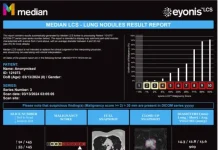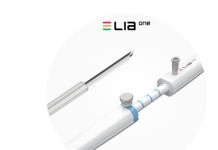The US Food and Drug Administration (FDA) has cleared OcuSciences’ retinal health assessment device, OcuMet Beacon.
The non-invasive device is indicated for ophthalmoscope scanning for infrared and autofluorescence imaging of the retina, with or without the use of a mydriatic agent.
OcuMet measures flavoprotein fluorescence (FPF), which can serve as a biomarker of mitochondrial dysfunction in retinal diseases such as glaucoma. According to the company, scans with the device are typically completed within minutes, with the in-built screen providing analyses upon completion.
Related: Vivasure wins CE mark for bioresorbable PerQseal Elite device
Ahead of the FDA clearance, OcuMet has been variously assessed, with a study evaluating the device at New York’s Mount Sinai hospital finding that FPF was significantly higher in glaucoma eyes versus normal eyes, especially in early-stage glaucoma cases in which damage is often hard to detect. Early detection of the condition is viewed as critical in maximising the benefits of treatment for patients.
With the marketing clearance, Michigan-based OcuSciences said OcuMet would “soon be available” for use in clinics and healthcare institutions across the US.
OcuSciences CEO Kurt Riegger commented: “With our collaborators, we are extending the depth of understanding for retinal diseases.
“This is a game-changer for the many patients and ophthalmologists who stand to benefit from more precise and deeper insight.”
Left untreated, glaucoma is the leading cause of irreversible blindness worldwide. Research indicates that the optic degenerative neuropathy will affect more than 110 million people globally by 2040.
Glaucoma can be treated with eye drops, medication, surgery or with femtosecond lasers that treat the condition by creating microscopic channels in the trabecular meshwork, improving fluid drainage and reducing eye pressure. In 2024, ViaLase secured a European CE Mark approval for its ViaLase femtosecond laser for glaucoma treatment.
Biopharma company Perfuse recently announced data from a Phase I/IIa trial of its intravitreal implant for glaucoma. Subjects treated with the implant registered a mean increase in optic nerve head blood flow of a minimum of 10% from baseline as early as week one, a benefit that persisted through week 24.
In other eye health developments, in March 2025, Pantheon inked a deal with Eyedeal Medical to advance the manufacture of its bioengineered corneal implants for treating corneal blindness.
According to the World Health Organization, corneal blindness is the fourth-leading cause of blindness globally, behind cataracts, glaucoma and age-related macular degeneration.




